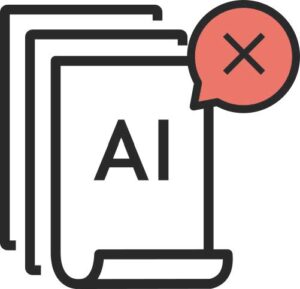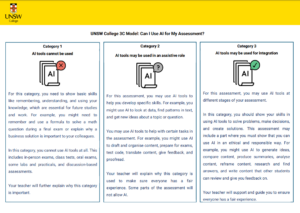The UNSW College Student Artificial Intelligence (AI) Guidelines have been created to support the responsible use of AI in your learning, study and assessment. The guidelines are focused on maintaining the integrity of your programs and to help you uphold ethical standards.
Select a topic below to find out more.
Appropriate Use of Generative AI
Guideline 1. Approved in a Course Guideline
Guideline 2. Study
UNSW College recommend that students use the College Microsoft Copilot AI Tool.
For example, this tool can help you to:
- Create practice quizzes or exam questions to prepare for a test.
- Revise skill level in mathematics and identify areas for improvement.
- Summarise lecture and tutorial notes to revise learning.
- Create realistic scenarios or case studies to comprehend how theoretical knowledge can be applied to real world situations.
- Produce synthetic datasets that mimic real-world data to practice analysis and interpretation skills.
- Reflect on inputs (i.e., prompts), outputs (text, image, audio or combination) and annotations to further develop your work.

Why Microsoft Copilot?
In May 2024, UNSW activated Microsoft Copilot with Commercial Data Protection for all staff and students with a zID. The protected version provides staff and students with a secure platform to ensure that sensitive information is securely stored and accessed only by authorised staff.
All UNSW College staff and students have access to Microsoft Copilot with Commercial Data Protection. Where the use of generative AI is allowed as part of coursework and/or assessment, this is the only generative AI platform recommended for UNSW College staff and students. The platform offers enhanced security, improved functionality and a better user experience.
To read about Microsoft Copilot’s internal release at UNSW please click here.
Guideline 3. Refining Writing
If an AI assessment icon says you can refine your writing with AI tools or as a copyediting tool, you may be permitted to use these tools for the following:
- Refine spelling and grammar.
- Revise style and tone.
- Improve clarity and coherence of writing.
- Improve vocabulary.
- Check your document for similarity to online sources.
- Assist in proofreading.
- Self-mark an assessment against a marking rubric.
Please carefully read your Course Outline and Assessment information. If you are unsure how AI can be used for an assessment, please speak to your teacher.
You might like to explore the Microsoft Copilot Lab for ideas. The lab includes tutorials that can show you how Copilot AI could be used to support your study. For example, there is a tutorial on how to refine your writing with Microsoft Copilot.
Guideline 4. Referencing and Citations
If you are permitted to use AI for part or all of your assessment, you must:
- Acknowledge and reference the AI tool using the referencing style for your course and program. For example, APA Style Referencing 7th edition.
- Please make sure that it is appropriate for you to use generated images, audio files and/or computer codes that have been generated by AI for an assessment task.

Microsoft Copilot, Referencing and Citations
- You may visit a number of websites and gather several weblinks when completing your assessment.
- Microsoft Copilot AI can be used to help you organise and write your references, by using the weblinks you have gathered. For example, for APA Style Referencing the following link might be useful: Generating APA Style Referencing using the weblinks you have gathered.
- It is important that you check that each reference and citation is correct before using it in an assessment. If you have any questions, please speak to your teacher.
Guideline 5. ELICOS
If you are enrolled in an English Language Course (e.g., FEEC, UEEC, EAE, TOP), please speak to your teacher about using AI to help you:
- Generate prompts to practice writing skills and improve vocabulary.
- Have conversations with chatbots to practice listening and speaking skills.
- Seek feedback on pronunciation from AI-based speech recognition tools to improve spoken English skills.
- Improve listening skills by using AI-enabled text-to-speech tools to convert written English into spoken word.
- Seek feedback on vocabulary usage, sentence and paragraph structure and academic writing skills.
As a UNSW College student, you will receive access to Mentor AI. This approved UNSW College AI tool will help you to practice your writing, listening and speaking skills.
Inappropriate Use of Generative AI
Guideline 1. Not Permitted
- You cannot use AI for an assessment when you see the Category 1 AI icon in your Course Outline under your assessment information.

Category 1: AI Tools Cannot be Used - If you choose to use AI for an assessment that prohibits it’s use, you will be penalised for academic misconduct.
Guideline 2. Written Assessments, Code and Creative Works
For any assessment, you are not permitted to use AI to:
- Answer assessment questions or write assignment content without proper acknowledgement and/or copyright attributions. Always check your Course Guideline to see if you can use AI tools for your assessment.
- Write entire assignments, code or produce creative works. You cannot use Microsoft Copilot AI or other AI tools to write or create a whole assignment. Submitting an assessment that is not your original work is a form of academic misconduct. If you use text directly from Microsoft Copilot AI, you must include proper acknowledgement and/or copyright attributions. Always check your Course Guideline to see if you can use AI tools for your assignment. If you are unsure, please speak with your teacher.
You will be penalised for academic misconduct if you use AI and AI tools to complete an assessment that prohibits the use of AI.
Guideline 3. Research and Assignment
You cannot use AI to:
- Create fabricated text, false materials or fake references and submit this work as part of a class activity or assessment. This behaviour is strictly prohibited. Where inappropriate use of AI is detected, you will be penalised for academic misconduct.
- Generate, retrieve and/or submit content for an assessment without approval and proper acknowledgement of the original source of information.
- If you use AI content to support your work, the content generated must be acknowledged in the text of your assessment and in your reference list.
Learn more about writing research reports and essays responsibly with Microsoft Copilot AI.
Guideline 4. ELICOS
- Translate text from one language to another in an examination.
- Write whole sentences, phrases and paragraphs for an assessment.
- Summarise long texts and submit generative AI summarised content as your own work.
You will be penalised for academic misconduct if you use AI and AI tools to complete an assessment that prohibits the use of AI.
Artificial Intelligence Learning and Teaching Guiding Principles
The College have developed a set of guiding principles for the responsible and ethical use of Artificial Intelligence (AI).
There are seven (7) guiding principles. These principles ask students to use AI ethically and responsibly in their study, learning and assessment.
Select a guiding principle below to find out more.
Principle 1. Communication
The College will provide you with clear communication about how you can use of AI for learning, study and assessment. For example, information about artificial intelligence is included in your Course Outline and Academic Integrity Policy and Procedure.
Principle 2. Responsible Practice
- When using AI, we ask that you behave responsibly in class and when studying online.
- The College will help you to better understand the ethical challenges of AI including privacy concerns and how AI might produce misinformation and biased content.
Principle 3. Diversity, Equity and Inclusion
We use AI ethically and responsibly to promote practical, accessible and equal opportunities for all students.

Principle 4. Assessment Integrity
The use of AI for assessment promotes the principles of academic integrity and ethical accomplishment of course learning outcomes and graduate attributes.

Principle 5. AI Competencies
AI-driven assessment will prioritise the development of essential AI competencies, technical and forever/power skills. These skills will help you to evaluate and interpret information for your course and program.
Please click on the following link to learn more about AI Literacy and Competencies.
Principle 6. AI Legislation
You are expected to adhere to relevant AI legislation to protect your personal information and prevent unauthorised access and use or disclosure of sensitive data.
You need to be aware of copyright laws, use of someone’s intellectual property and permissions for using copyrighted material/s for any of your work.
For more information, please read this discussion paper on supporting Responsible AI.
We encourage you to watch this video about Regulating AI.
Principle 7. Evaluate
Closely evaluate any AI-enabled technologies to protect your personal information and the information of others.
Learn how to critically evaluate AI Applications here.




